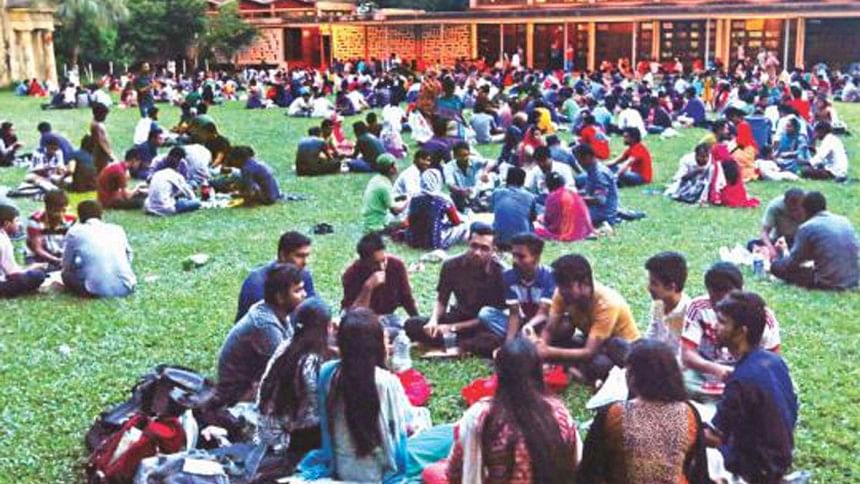Institutional reputation through enabling students first

The Academic Experience Project is a faculty-student collaborative work aimed to glean insights about the experiences of tertiary-level students. Each Friday, The Daily Star will publish an op-ed highlighting the findings of the project. This is the fifth article of the series.
In a nation that has a university every 5.38 square kilometres in its capital and with a university that is still lauded by some as the "Oxford of the East", it is no coincidence that Dhaka is recognised as the university capital of the world. Undeniably, the sheer number of universities have made higher education much more accessible to students of varying socioeconomic backgrounds. However, many of the universities have a dismal and lacklustre record regarding the quality of the educational experience they provide. Understandably, their standings in global university rankings are undistinguished.
A recent survey of students, from both public and private universities across Bangladesh, showed that their satisfaction derived primarily from how well their universities prepared them for the job market and their institution's brand value. However, what is perennially missed by academic administrators is that student satisfaction is also greatly influenced by the atmosphere of the campus and the time they spend in it, the sense of community they build, and the joys they experience as they socialise and network with each other. In order to foster that sense of community and encourage collaborative learning among students and between students and teachers, there needs to be a safe and secure space in addition to proper facilities. A majority of the respondents found these provisions to be largely unsatisfactory.
Students also indicated that meeting the minimum physical requirements such as providing classrooms, sanitation facilities, and computer labs is "not what a university is all about." These are not extraordinary features; rather they are just basic necessities. At this level, what should be prioritised is maintaining and updating the current facilities. Thus, if universities are still using the same computer lab equipment, have only one photocopying machine for an entire department, and books in the library from 10 or 15 years ago, this will not do.
Moreover, by situating themselves in commercial buildings or in the outskirts of Dhaka, universities have sacrificed the important role that physical infrastructure and access play in providing a holistic academic experience. These cost-effective moves are important as long as the expanded set of requirements suggested by the students are met. Also, by regularly repainting the building exteriors to look fresh and new, a choice is being made to sacrifice the greater good for a face lift that hides the deficiencies within.
Covid-19 has also recently exposed the severe lack of technological and digital infrastructure; most, if not all, universities in Bangladesh are painfully ill-equipped when it comes to online learning platforms. An extensive technology and digital infrastructure will equip students with the ability to access much needed books and journals, class materials, presentations, testing, and even allow them to communicate with the university's management and faculty online. It will also allow them to register for courses, receive grades, and pay their dues from anywhere in the country. This platform would further facilitate the creation of the university's own digital library that can house published work needed by the faculty and students. Adapting to the new normal of online learning would have been infinitely easier had there been a sophisticated technological and digital infrastructure in place.
Well-established physical and technological infrastructure also provide universities a competitive edge on a global scale. This is particularly true in an era when students have access to online courses from anywhere in the world. If the pricing is right, and if they can afford it, many students will prefer an overseas degree. With technology paving the way, access to foreign universities will become ever easier. It is time to rethink a university's technology strategy or adopt the path of the dinosaur.
Many universities also fail to update the information they provide on their websites. As a result, they fail to communicate their achievements with agencies like Times Higher Education and miss out on international recognition-building. Even if professors and students successfully produce and publish substantial research work, they will not get the spotlight they deserve if they are not showcased by their university on their own platforms.
It is also time to tap into the knowledge creation potential that already exists in Bangladesh and start a national discussion about larger investments needed in research and collaborative work among students and their teachers by setting up spaces where students can enter the world of discovery. If our universities are to truly strive for excellence and gain international stature and recognition, we will have to start by providing our students an experience that is much better than the bare minimum. Cost should not be the only criteria for running these universities: here, effectiveness must trump efficiency.
For universities in Bangladesh to compete internationally and make their way into global university rankings, they'll have to do more to capitalise on their biggest asset: their students. These are the very students who graduate from local institutions and go on to thrive abroad in well-designed academic environments where they are often celebrated for their excellent research work. Should we not exert the extra effort to build similar enabling environments to keep them here and tap into the human capital they represent that is so desperately needed by this nation?
Najeeba Mohammed Altaf is working on her MBA degree at IBA, University of Dhaka. Dr Andaleeb is Distinguished Professor Emeritus, Pennsylvania State University and former Vice Chancellor, BRAC University. He taught one semester at IBA, University of Dhaka. This article is the result of his collaboration with students to turn the spotlight on higher education in Bangladesh. For more information on The Academic Experience Project, contact Dr. Andaleeb at [email protected].

 For all latest news, follow The Daily Star's Google News channel.
For all latest news, follow The Daily Star's Google News channel. 



Comments